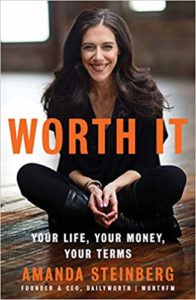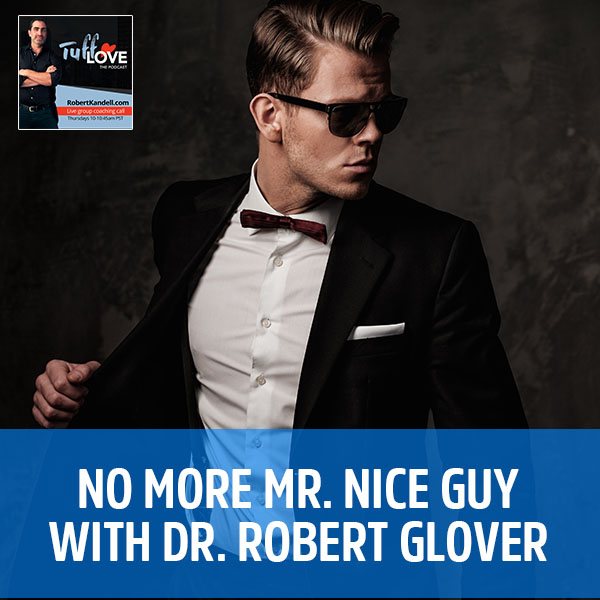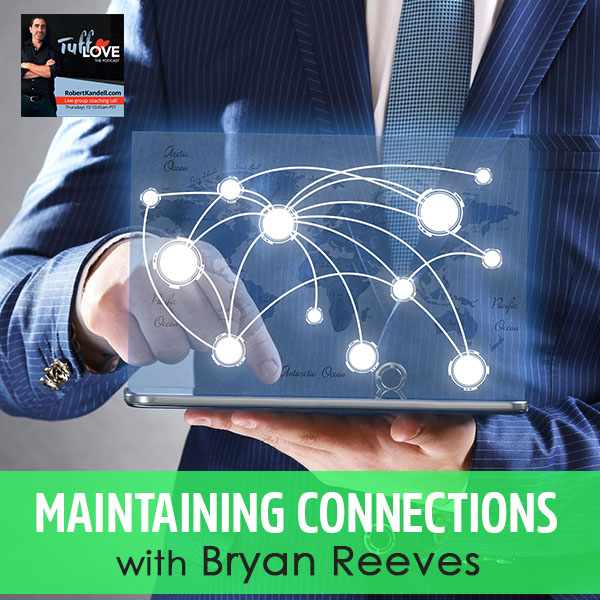
168: Worth It: Your Life, Your Money, Your Terms with Amanda Steinberg
Nov 13, 2018
We constantly hear the traditional narrative about money: you grow up, get married, combine your finances, then save for retirement. However, what people fail to say is that it doesn’t always work in a linear fashion. Financial expert, entrepreneur and human rights activist, Amanda Steinberg knows this to be true. That is why she dishes out on the confusion that usually happens about how money gets tangled in all these awkward things that no one really talks about: love and sex. She talks about the concept of the impact of money and finances have on these aspects and how not paying attention to them can affect relationships. Laying down the five motivation types of people around money, she gives advice on how to handle relationships when people have different money perceptions. She also coaches you to get over humps cause by finances to get to more intimacy while sharing what you need to know about savings.
168: Worth It: Your Life, Your Money, Your Terms with Amanda Steinberg
I am very excited to welcome Amanda Steinberg. She is a friend of mine, someone I’ve worked with in different companies and truly a brilliant entrepreneur, investor and creator of many worlds. She has a book called Worth It. She created an incredible website called DailyWorth and I’m excited to present her show and her concepts about money, relationship and how to have healthier both. She is a person in the world who I respect deeply, and this is not lip service, this is someone I’ve had the pleasure to know and to work with. She is kickass, badass mama, Amanda Steinberg. She’ll talk about the concept of the impact of money on love and sex. Amanda, welcome to the show.
I’m so glad to be here, Robert.
You are a financial expert, entrepreneur and human rights activist. In 2009, she launched DailyWorth to bring a fresh voice to personal finance, which grew to 1.2 million newsletter subscribers and was acquired in 2017. In 2015, Forbes named you one of the 21 New American Money Masters. In 2016, Oprah selected her for the inaugural of SuperSoul 100 and Fast Company named her one of the most creative people in business. You’re a badass. There’s no other way to put it. We’re going to geek out because this is both our passions. We’re both money geeks and we’re both relationship geeks. We’re talking about the impact that money and finances and not paying attention to money and finances can have on relationships. Do you want to start off with a thought or a viewpoint or your experience? Give us little hints.
There’s this traditional model that no one ever really questioned, which is you grow up, you get married, you combine all your finances, you save for retirement. Everything works except unfortunately it doesn’t always work out in such linear fashion. Lots of confusion happens but because love, sex and money are all awkward things to talk about, there aren’t a lot of creative conversations happening about how to navigate what pretty much everyone encounters on one level or another.
I’ve been doing a lot of reading about the changes in terms of relationships as time goes on. A lot of part of my thesis of the book is this concept of things being different in the 1950s, 1960s, 1970s and now you look at 2018. We’re living in a different world where men and women are having different relationships, and one of the biggest pieces is the separation of finances. There’s this chasm. People are not getting married, people are not falling into that default path you mentioned. What do you think the motivation is for people not to combine finances in today’s world?
I’m living that myself. I am seven years divorced and right during my separation, I ran into the nerdy boy from middle school. I swore off all relationships, swear off all commitment forever coming out of my marriage and he shows up in my life. The reason why I had sworn off relationships after my separation was because I felt like I always had to modify some part of myself. I always had to become something that was different from who I am. For example, my level of ambition, which is very high, was perceived by me and others as damaging to my family because I was always so preoccupied with work. I spent two years in therapy trying to reduce my ambition and I failed. I got really depressed. It’s who I am. When I separated, I thought I don’t ever want to feel controlled or wanted to be changed by anyone.
It so happens that a guy shows up in my life who’s still the love of my life, where he had no intention of wanting to change or modify me even to this day, some of the hell I pull. I’d say, “Aren’t you sick of me being this way?” He goes, “No, I signed up for you when I signed up for you and it’s who you are.” Who knew that was even possible? One of the things that’s remarkable about our relationship is the way in which we intentionally live separately, raise our children separately and don’t combine our finances. I spend most of the time at his apartment because he likes things in a certain way. He does all the cooking and all the cleaning and doesn’t let me do either because he says I suck at both of them, which is fine with me. A lot of people would say, “That’s sad or that doesn’t seem right in a relationship,” but it’s what for us enables the romantic phase to continue on years now because there’s none of that extra pressure. All the other stuff, we handle on our own.
You never told me that story about the ambition. It reminds me of gay conversion therapy. There are all these movies coming out that I’m interested in. We put people of different sexual orientations through because they don’t fit the standard of what society is and I could imagine the ambition reduction therapy. I can’t even imagine that even come close to working with you, but I understand that. We do get into relationships to be smaller and a lot of those pieces are appetite and around money and so much charge and different ways of being. My next question is if you have two people in a relationship and they have different relationships to money, let’s say one is tight, one is very fluid, and they love each other. How do they be in a relationship without killing each other?
We studied this extensively at DailyWorth with lots and lots of data, PhDs and statistical analyses. Ultimately, what we uncovered was that there are five motivations around money and everyone has a primary. Some have two that are close, but everyone has five primary motivations. Once you understand what your motivation is around money, you’ll also understand what your sabotage pattern is and then you can manage for that. What we often try and do is change someone’s sabotage pattern, but you’re not going to be able to do that. Instead, you have to scaffold it.
Once you understand what your motivation is around money, you'll also understand what your sabotage pattern is. Click To TweetHere are the five types. The first is the producer. Your primary motivation is security. That person’s sabotage pattern is they avoid risks. They’re the person that piles money in their savings account and maybe stays in a job that they hate and never grows. The second is the nurturer. The nurturer’s motivation is connection and relationships and their sabotage pattern is they’re always going to take care of everyone else before themselves. The third is the epicure. This is going to sound like the materialist and epicures feel bad about themselves. Don’t. You’re the sensory, beauty, design, visual person in the world. Imagine if we didn’t have you, it would be a really ugly, horrible place. By the way, the sabotage pattern of the epicure is always seeing the value of something beyond the amount of money that they have. The value of that item outweighs its monetary value or their managed monetary capacity.
The fourth is the visionary. The visionary is the entrepreneur. The massive sabotage pattern of the visionary, which is me, is not seeing risks. It’s the opposite of the producer. The fifth is the independent. The independent wishes that they lived off of the grid and didn’t ever even had to think about money. Their sabotage pattern is they will not think about money until they hit a wall and that’s oftentimes the worst time to think about money. If you’re in a relationship, think about it. Are you the producer, the epicure, the visionary, the independent or the nurturer? Understand that’s the person’s gift and it’s also their sabotage pattern. If you’re with a nurturer who’s never going to save money because they’re always going to want to give it to everyone else, then the thing to help that nurturer understand is that by saving more money themselves, they’re then able to help even more people. It’s a reframe. That might have been more extensive than what you were looking for, but it’s the answer.
I never heard this one either, so maybe I can get an article or two. I don’t know if you’ve ever codified that.
It’s in my book and there’s also a website where you can go and take it. It’s called MoneyType.me and you can find out your full report there.
Do you know Jaiya Ma? Have you ever heard that name before? She’s one of the best sex educators out there in the business. She came on the show and did the erotic blueprint, which is the sexual analogy to what you said because there are five types. I don’t think they match one to one, but it was like a similar experience of listening to what you talked about and then compared to.
These are all depth psychology archetypical systems. Jungians understand deeply enough to know which ones essences do apply to different circumstances.
The second thing I’ll admit is me and my wife, Morgan, we were trying to figure out what we are. Maybe we’ll take that quiz when it comes down to it. You get a feeling of who you are, you get a feeling of what your motivations are and what your sabotage are and then you come to the kitchen table. You’re starting to talk about dreams and thoughts about money. Then you hit a wall because you are of different archetypes and you are with different desires and you are different people. How do you coach people to get over these humps and over these walls to get to more intimacy?

Love And Sex: Just because you love someone and are married to them doesn’t mean you can’t separate part of your assets.
Unfortunately, we can’t change each other. There’s always this desire, especially when it comes to money. Everyone thinks they’re supposed to be a producer. Producers make up about 30% of people and they’re the ones who are good at budgeting. They’re good at checking checkboxes and making plans. It’s very hard for anyone who’s not a producer to become a producer. What you have to do is you have to build a scaffolding. For example, I’m a visionary and I will make $1 million and then I’ll go $200 million in debt. It’s because I don’t see the risk. I try to see risk, I always see the opportunity. I don’t see what could go wrong. Does that sound familiar? Knowing me, I’ve put a lot of scaffolding up to make sure I don’t do further damage to myself because I have dug myself into such massive holes over the years.
For example, my scaffolding is my income right now, which is consulting, goes into a business bank account. That business bank account goes up and down, but I pay myself a fixed salary from that and it’s hard. That money that’s growing in the business account, I want to take that out and I want to put it into an investment or I want to buy a house or something like that but that is the absolute scaffolding that I need to separate my business income from my personal income and make sure that I’m living consistently. For example, I’m looking ahead and I’m like, “I don’t want to work for the last two weeks of December.” I may modify some of my contracts and I have this money there where I can pay myself without having to constantly run out of money, for example, because I’m spending all of it or investing all of it. That’s one example. That’s fixing my sabotage. I have them for each.
I have never read your book yet I should. It impacted many of our mutual friends. What I’m hearing is to know yourself, to know your ideas and your concepts and not shame yourself for it, embrace it.
Your sabotage pattern is also your gift. They go together.
It’s not like you’re trying to change yourself or change the other person, it’s creating structures to enable yourself to be in the optimized version of your gift. In money and relationships, people fight about money all the time. It feels like sex and money tends to be the main things people fight about. In terms of money, if someone’s in a deep argument about the money, he spends too much or he’s investing. What are the steps to bring it back into a deeper relationship with someone?
Jordan and I don’t fight about sex and money. I’m proud of that. They are the only two areas I don’t have issues. I got issues everywhere else, but I have grown up finally. When it comes to money, let’s say you’re a visionary married to a producer, which is very common. One’s a risk taker and one is security minded. They are going to be totally at odds. I remember when I was working at DailyWorth, we all identified with each other around our money types because it helped us understand how we work together.
Your sabotage pattern is also your gift. Click To TweetMy friend, Ali Brown, who’s an incredible entrepreneur, she’s independent. She’s a multimillionaire and she’s someone who would live off the grid if she could, which is good to know because independents are like, “I hate money. How can I ever make it?” There are plenty of independents out there who are extremely successful. The minute she reached a level of affluence that she had hoped for, she sold her house and took her family on the road. That sent most of the DailyWorth office into a panic attack mode. They could not imagine freewheeling it. A lot of those triggers is where one gets joy and energy and it is exactly what’s going to trigger the other person.
What I speculate at this point is that we have to break some of the common models. Just because you love someone and are married to them doesn’t mean you can’t separate part of your assets. Some couples I know, one partner always needs $3,000 in the bank, another partner is fine with $300 in the bank. Create your bill paying account that you both contribute to. There are all sorts of ways to do this and then create separate accounts. I’m not sure if the money first goes into your separate accounts and then goes into the joint account, or that joint account then goes to the second account. There has to be a certain amount of money that each partner has full control over without the other person even seeing what happened. It’s like reading someone else’s text messages. As much as you love someone, you don’t want or need them questioning everything you do all the time. What do you think? Am I being way too tactical and you think it’s more?
It’s a pragmatic show. We get down to the nitty-gritty. I would imagine the differences and then you said agreements. Let’s say you have the two accounts, you agree to a certain percentage of your income or a certain amount per month to pay the bills. You set the budgets. That does take consciousness, communication, being deliberate and knowing your money. When I coach people on the business, often the first question I ask is, “How much money do you need per month to live?” It’s shocking amount how many people don’t know what they spend or they think they know and then they go do the work and their expectation is half or three-quarters of what they spent. People don’t have awareness around their expenditures.
It’s hard. There are a lot of transactions going through. I got one more tip for you on that one because when I started DailyWorth years ago, I was making $200,000 a year and I was completely out of control. I’ve devoted my life to mastering this for someone who’s off the rails, sometimes manic. What you want to do there is you want to determine how much you have to pay every month in bills, and this includes double your minimum credit card payment. The other minimum loan payments like a student loan, a certain amount into savings and a certain amount into retirement. I would be here all day if I got into the specifics, but this is a broad stroke.
From there, you determine how much you want to spend on everything else that’s unexpected, that’s hard to track and you transfer that on a monthly basis onto a separate debit card. I happen to have my sustained account at Bank of America and I have my spend bank account at Capital One. I’m not endorsing them, it’s just what I do. On a monthly basis, I very consciously move $1,000 over because I know that’s going to work and I’m never spending money that’s already been allocated to my savings, to my retirement, to all my bills. Can I throw a complex one at you or I’m just going to scramble everyone’s brains?
As much as you love someone, you don't want or need them questioning everything you do all the time. Click To TweetLet’s take a risk. Let’s go crazy.
You want to pay double the minimum on your credit card if you’re paying that debt and then you want to put whatever is extra in your emergency fund. People always want to take all their cash and throw it at their debt. Then they expose themselves to more debt because they’re not saving but if you pay double the minimum, then you’re also paying interest. If you only pay the minimum, you’d never pay off your credit card because you’re only paying the interest. When you have this separate debit card that’s for all this stuff that’s not predictable, then you get to see where you’re overspending. You don’t have to be meticulously budgeting if you’re not a producer. It works.
Let’s talk about savings a little bit because this is something that people would be interested in. Where do you recommend people put their savings? There are a lot of studies that the people who are 50 or 60 or coming towards retirement don’t have any savings and what are they going to do? They’re going to work for the rest of their lives. There are stories about older people working at Walmart to get by. There’s this new level of poverty that these generations are having. In terms of savings and retirement for your older years, do you have a standard thing you recommend to people in terms of planning for the future?
I do, but first I want to say two things. The first is that retirement is a made-up concept that is very American fitting in a prior age. This idea that we work at a job, we get a pension and then we stop working at 65 is antiquated. It only came about when life extended in 1900. It’s a concept overall that needs reinventing because it doesn’t make sense the way most of our lives go now. The second thing is the way wealth and equality have grown in this country is beyond most individual’s control. We all experienced an enormous amount of shame because we can’t keep up with the talking heads and telling us, “You should put 10% in retirement and 10% in an emergency fund,” and all that and everyone’s like, “I can’t do that.” I want to give people a little room to release the shame and guilt over not having performed because the system is screwed. In that context, we have to reinvent what it means to retire. We all have to take positive, constructive steps in the direction even if we don’t feel like we’re doing enough.
For example, I am pretty sure in my old age, I’m going to live with some of my girlfriends who I’ve been close with since I was five. We all left Philadelphia and then we all suddenly found ourselves back in the same neighborhood. It’s so cliché, but it’s awesome and I was like, “I started out in my life with you. I’m probably going to end up my life with you.” I’m also nice to my children. Being a risk taker, God knows what damage I may do to myself despite what progress I make. I always say to my kids when I give them second dessert, “Remember how good I am to you so that when I’m 80, you’ll take care of me,” but I’d say that kiddingly. Most of the world doesn’t have this retirement set up that we do and we’re going to see a pretty big restructuring.
If you want to start investing outside of your 401(k), if you have a 401(k), it’s already determined what that is. Go make your HR person explain to you what the funds that make up your 401(k) are, that you’re investing in ideally index funds not moving money into cash. Some people are investing in their 401(k) but they never checked the checkbox of the fund so it’s sitting there for ten years in cash. Please be careful that it doesn’t happen to you. If you want to have a retirement account that’s outside of your work, I strongly recommend you look at the company called Betterment.com. It’s been around since 2009. It’s the leader in the digital investing space. If Steve Jobs had designed an investing platform, I believe he would have designed Betterment. There are a few things. Do you want a Roth? Do you want a traditional? That might give you a slight hiccup but with their tech support, their chat window, I believe that they are the best for someone who’s not sophisticated and who don’t qualify or want to work with a human advisor.
I use a company called WealthFront. I’ve heard that before, that the concept of retirement is antiquated. I can’t imagine stopping at 65. I’m sure Morgan might want me to slow down at least at 65. I can’t imagine retiring, but it’s really about a conscious choice. We have to assume that things are different and you don’t know what’s going to happen, if your health is going to decline, if your physicality is going to decline and to start to make plans. I like your girlfriend housing situation. It is a great model for connection and a cheaper way to live.

Love And Sex: The most exhilarating thing in life is when you know you matter and mean something to someone else.
It’s like this rugged individualism, “I’ve got to do it on my own,” sounds lonely to me.
In terms of your path, you started DailyWorth. What was your favorite part of that experience? Was it a concept that started it? How did you come across building that website?
I’ve always been entrepreneurial and I always thought the email newsletter business was a really powerful business model. Then it was in 2007, 2008 when I got a $60,000 tax bill that gave me a full-on heart attack because I wasn’t managing my income properly and which was growing and suddenly everything got wiped out. Rather than hire a financial advisor, I thought I would start publishing honestly on the internet and be held accountable by people and be authentic because that’s way more interesting than the budget advice I’d been following that didn’t seem to work. When I started DailyWorth, all I knew how to do was earn. I was learning as I published. I learned a lot over the years because I didn’t take all of the Suze Orman and David Bach, all these people that I know now, personally, it’s fine, they’re going to be like, “Don’t make fun of me.” I’ve absorbed all of that material over the years and tried to implement in my life.
Turn your pain into your purpose. Click To TweetIt’s designed for the producer mentality and I don’t have the producer mentality. I’ve been the visionary mentality. I was able to construct solutions that resonated. The best part of running DailyWorth over the years was I would hear from people two years, three years after having first encountered them on an email or on a chat window or something where they would say, “That thing you told me two years ago, I’m buying my house now,” then I’m going to start crying. “I reached $20,000 a month in revenue and I never thought I could exceed five because it didn’t seem possible until you explained to me how to do it.” It was those multi-year situations where I would give someone like an ounce and it would change the trajectory of their life. That to me blew my mind. I’m like, “I’m not a fraud. I know what I’m talking about,” which is cool. That’s what we want. We want to make a difference in people’s lives. That’s the most exhilarating when you know you matter and mean something to someone else and that your life is worthwhile and you’re not taking up space. That was the coolest part of DailyWorth.
My analogy is when people say they’re in a better relationship with themselves, a better relationship with their partners, a better relationship with their purpose. People are so nervous and scared about money. It feels so overwhelming and what they do is they non-confront. It’s like your $60,000 tax bill, we non-confront what we don’t understand. You turned your attention, you turned your awareness, you turned your self-permission to understand what it was and that enabled you to create this whole platform for more people to confront their finances.
You turn your pain into your purpose.
You’re consulting now, you’re working with companies, you’re working with exciting companies and delved deeply into politics. Do you have a next future dream about something you want to create? Do you have a next visionary thing that’s on the horizon?
I’m trying to move very slowly. I can see myself in a CEO job with 50 employees and a massive payroll and getting on planes. When I sold DailyWorth, I asked my nine-year-old daughter how life has changed, she said, “You don’t cry anymore and you talk to me at dinner.” What I’m going to do next includes me not crying anymore and talking to my children at dinner. That’s all I can tell you about what I’m doing next.
Do you have anything you want to point people to, your own website, your own work or something you recommend?

Worth It: Your Life, Your Money, Your Terms
I’m @AmandaSteinberg on Instagram. My Twitter is a mess after the elections so I don’t know if that’s entertaining to anyone, it’s a lot of screaming. My website is AmandaSteinberg.co. You can drop your name in. I’m not emailing anything right now, but as I have things to announce about what it is and I’m doing, I will be using that channel so feel free to sign up there or find me on social media.
Your book is Worth It available in all the usual places. This is Rob Kandell. We’re doing our Indiegogo campaign and still happening. You can find that at RobertKandell.com/book. The book is shy of one month away and my twelve-hour bookathon. My Jerry Lewis telethon will be happening on December sixth. We’ll be announcing about that. Thank you so much, Amanda, for joining me on the show.
Thanks for having me.
If you want to find out your money type, go to MoneyType.me. Also, you can check out DailyWorth or Amanda’s book called Worth It. For more about me, please visit RobertKandell.com. You can pre-order unhidden: A Book For Men and Those Confused By Them on my website. Thank you so much. Go forth, be merry. I love you. Take care.
Resources mentioned:
- https://www.Instagram.com/amandasteinberg
- https://www.Facebook.com/amandasteinberg
- https://Twitter.com/amandasteinberg
- Worth It
- DailyWorth
- MoneyType.me
- Jaiya Ma – previous episode
- Betterment.com
- WealthFront
- @AmandaSteinberg on Instagram
- AmandaSteinberg.co
- RobertKandell.com/book
- unhidden: A Book For Men and Those Confused By Them
About Amanda Steinberg
 Amanda Steinberg is a financial expert, entrepreneur and human rights activist. In 2009, she launched DailyWorth to bring a fresh voice to personal finance. DailyWorth grew to 1.2M newsletter subscribers daily and was acquired in 2017. In 2015, Forbes named her one of 21 New American Money Masters. In 2016, Oprah Winfrey selected her for the inaugural SuperSoul 100 and Fast Company named her one of the Most Creative People in Business. Prior to her career in finance, she was a computer programmer and founder of Soapbxx, a digital agency focused on non-profits. She’s the author of personal finance book Worth It: Your Life, Your Money, Your Terms.
Amanda Steinberg is a financial expert, entrepreneur and human rights activist. In 2009, she launched DailyWorth to bring a fresh voice to personal finance. DailyWorth grew to 1.2M newsletter subscribers daily and was acquired in 2017. In 2015, Forbes named her one of 21 New American Money Masters. In 2016, Oprah Winfrey selected her for the inaugural SuperSoul 100 and Fast Company named her one of the Most Creative People in Business. Prior to her career in finance, she was a computer programmer and founder of Soapbxx, a digital agency focused on non-profits. She’s the author of personal finance book Worth It: Your Life, Your Money, Your Terms.
Podcast: Play in new window | Download







